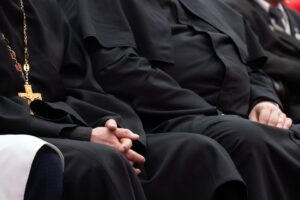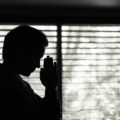Division and distrust – Abuse inquiries divide European clergy
Division and distrust – Abuse inquiries divide European clergy
The release of the French inquiry into abuses by Catholic clergy has sparked further divisions among European bishops about how to investigate their past.
The publication of the Sauve report, an independent inquiry into abuse in the French Catholic Church, has made headlines across Europe. Although the report has damaged the reputation of the Church by highlighting its past errors, it has also been a step towards a recognition of the true extent of the problem. This step has been possible because French clergy have openly accepted the findings of the report and have, literally, kneeled for forgiveness. In addition, they have committed to compensating every victim of abuse, even if the cost means the Church has to take out loans or sell some of its property. [1] [2]
However, not all European clergies have conducted similar inquiries or responded to them in the same way as France. This has meant that a very uneven picture has developed across Europe with different decisions made by bishops in each nation. This article will look at three different experiences, that of Germany, Portugal, and Spain, and see how they compare to France.
Interference and controversy – Germany’s struggles to build confidence
Although the most wide reaching, the French report was not the first inquiry into abuse in the Catholic Church. In fact, the report referenced the previous experiences of countries such as Ireland, the Netherlands, and Germany.[3] But crucially, it went a step further than other inquiries by allowing the investigators to be fully independent. As explained by Archbishop Olivier Leborgne, the independence of the report was crucial due to the degree of “suspicion hanging over us Catholics.”[4] The danger of deepening suspicion is clear when we look at the German Catholic Church’s attempts to manage inquiries into past abuses.
The German Catholic Church’s inquiries have often caused more issues than they have resolved. The clearest example of this was the Archbishop of Cologne, who faced calls to resign after he delayed for months the publication of a report on alleged sexual abuse of minors. Cardinal Rainer Woelki justified not making the report public by citing the “alleged perpetrators’ right to privacy.”[5]
Woelki’s delays in publishing the report led to a rare public criticism from the diocese of the council of Cologne. The council, which brings together clergy and laypeople, said that Woelki had “completely failed as a moral authority” and concluded his actions had led to the “biggest crisis that the Church has ever experienced.” Victim groups also expressed their fury at his actions.[6] In the end, Woelki refused calls to resign, and Pope Francis granted him a sabbatical.[7] This type of scenario has only served to undermine trust in the Church’s investigations.
Prior to the release of the French report, Germany had conducted an independent inquiry in 2018 which uncovered 3,677 cases of abuse. However, at the time, the report’s authors pointed out that the number of victims was likely much higher since many people choose not to report abuse, describing the number as the “tip of the iceberg.”[8] Given how the situation with Woelki unfolded, it would be easy to understand why there is still great doubt about the extent of abuse in Germany and much more will need to be done before some type of forgiveness or clarity is possible.
“We are not afraid” – Portugal’s change of direction
Therefore, it is clear that the management of abuse inquiries in Germany has led to an even further decrease in trust rather than an improvement. However, the reality is that German bishops have done more than their counterparts in some other European nations.
In Portugal, the Church has only investigated about a dozen allegations of sexual abuse involving Portuguese priests. Of these cases, more than half were dropped because church investigators decided there was not enough evidence to pursue them. But following the publication of the Sauve report in France, there has been a change of approach by Portuguese bishops.[9]
This change has been influenced by greater demand by Portugal’s Catholic community for active investigation into the issue. This culminated in a letter signed by 200 prominent Catholics which appealed to the Church to conduct a similar inquiry to that of France. Following a four-day meeting over the issue, the president of the Bishops’ Conference, Bishop José Ornelas, stated the Church “was not afraid” of conducting a similar type of investigation. Therefore, it has been announced that the Church will set up a national committee to actively investigate abuse and to better coordinate the work of local church groups looking into cases of historical abuse.[10]
Spain’s bishops unmoved
With Portugal’s change of direction, Spain is left alongside Italy as one of the two major Western European countries that have yet to allow an active push to find cases of abuse.
Prior to the Sauve report, leading Spanish clergy had said that they would not “carry out a programme of general investigation” and would not facilitate a “proactive search” for historical cases of abuse.[11] Crucially, this included denying any investigation, whether internal or external, that would allow experts to look at ecclesiastical archives.[12]
Yet unlike in Portugal, the Sauve report has not changed the attitude of the leading Spanish clergy, who have proposed only minimal efforts. This led Migual Hurtado, a victim of abuse and an activist on the issue, to state that the reason that Spanish bishops refuse to carry out an investigation of compensation for victims is because “if in France there are 330,000 cases, how many are there in Spain? Half a million?” This contrasts deeply with the fact that Spain has so far only officially recognised 220 cases of abuse by clergy members in the last two decades.[13]
Another former victim, and now deputy in the Spanish parliament, Juan Cuatrecasas has said that the numbers from France show that Spanish bishops are in “denial” regarding the extent of the problem.[14] This sense is only deepened when leading clergy members like the Cardinal of Madrid, Carlos Osoro, appear on television to say that all victims of abuse are “sacred,” yet at the same time refuse to take proactive action to identify them.[15]
A key to the future
As the French investigation has revealed, the investigation of past abuses by members of the clergy leaves the Catholic Church in a dilemma. If they do allow independent investigations, then they must face the findings of those investigations and the criticisms they bring. However, if they do not allow independent investigations, then it appears that they are continuing to cover up the wrongs of the institution, further undermining trust.
Given that the Church’s policies with regards to past abuses have been linked with a rapidly increasing decline in the number of European Catholics, it seems that this issue will be a major factor in determining the future of Catholicism on the continent.[16]
Interested in similar topics? Go to our Dashboard and get free updates.
Sources
[1] French bishops kneel in penance over Catholic church’s role in child abuse
[2] French bishops agree to compensate sex abuse victims
[3] Abuse report on the Catholic Church in France — a shock, but not a surprise
[4] An inquiry exposed sexual abuse within French Catholic Church — now what?
[5] Cologne diocese abuse scandal: Investigators identify suspects
[6] Germany: Calls for cardinal to release report on sexual abuse of minors
[7] Cologne cardinal stays, despite sex abuse cover-up scandal
[8] ‘Shocking’ sexual abuse of children by German clergy detailed in report
[9] Portugal’s Catholic Church plans committee to probe child sex abuse
[10] Portugal’s Catholic Church plans committee to probe child sex abuse
[11] ¿Por qué la Iglesia española se niega a investigar la pederastia?
[12] Un ‘estudio interno’ para conocer el alcance de los abusos en España: la propuesta que algunos obispos plantean llevar a la Plenaria
[13] Miguel Ángel Hurtado: “Si en Francia las víctimas de abusos son 330.000, ¿cuántas hay en España? ¿Medio millón?”
[14] Miguel Ángel Hurtado: “Si en Francia las víctimas de abusos son 330.000, ¿cuántas hay en España? ¿Medio millón?”
[15] Carlos Osoro: “Pido perdón públicamente por los abusos. Las víctimas son sagradas”






